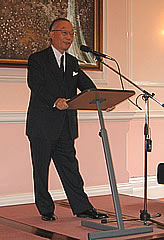 |
Ambassador Orita praises the enthusiasm of the contestants
|
Dear Finalists in the Contest, Distinguished Guests, Ladies and Gentlemen,
I wonder whether I should make my speech in Japanese? I also wonder whether my speech in Japanese will satisfy the judges sitting and taking notes with grim faces over there? But as today's finalists are going to speak in Japanese which is not their first language, I will try to make my speech in English which is not my first language. I am delighted to welcome you all, especially so many enthusiastic students of the Japanese language , to the first ever Japanese Language Speech Contest for Secondary Schools.
To learn a foreign language may not be easy but it is extremely important. At the same time, it is a fun. Isn't it? The language is the most importan t gateway to the understanding of other cultures and to learn another language certainly widens your scope of horizon and scope of your fun. English is regarded as the common international language of the world. Perhaps you may be able to communicate to a certain extent with peoples of many different cultures in English. But I strongly believe that English-speaking people should learn other languages especially difficult and totally different ones like Japanese to understand much deeply different cultures and different ways of thinking.
I am happy to note that the number of people studying Japanese in the United Kingdom is increasing . At university level approximately 2,600 students are studying Japanese . In language colleges, the situation is even better with Japanese ranked as the fourth most popular language after French, Spanish and German. Over 10,000 secondary school pupils, including six formers are taking Japanese courses . This number is about 5 times bigger than 10 years ago.
When you study Japanese, you become aware of the differences between Japan and Britain, not only in terms of language but of history and culture as well. However, despite those differences, you will also find there is much in common between our two countries. Both countries are island nations which have colourful historical and cultural relationships with the continent. We both respect our traditions while developing and embracing a lot of new and imaginative ideas for the future.
Now, our two countries have enjoyed warm and friendly relations many years. We co-operate with each other in many fields such as economic, business, political, science and technology and cultural areas. We co-operate with each other to the benefits of our countries but also to the benefits of the world. Studying Japanese will open up a lot of new future possibilities for you and enable you to make new and interesting friends with Japanese people .
One of the most sensible things you can do to make new friends with Japanese people and practise the language is to actually visit Japan. The Japanese Government is currently running its ��Ϸisit Japan Campaign' . Britain is one of the main target countries and we hope the campaign will encourage more British people to take much more interest in Japan, and to visit Japan .
We already have some exchange programmes offering young people the opportunity to visit Japan. For example, there is the Encounter Japan Programme , through which Sixth-Form students spend 10 months living and studying in Japan. Then there is the JET Programme, whereby every year roughly 500 young British graduates go to Japan to work as assistant English language teachers. Why don't you consider taking part in these schemes in the future?
I wish you every success in the study of the Japanese language and every success in your future! And I also wish all the best to the finalists at the contest!
|


